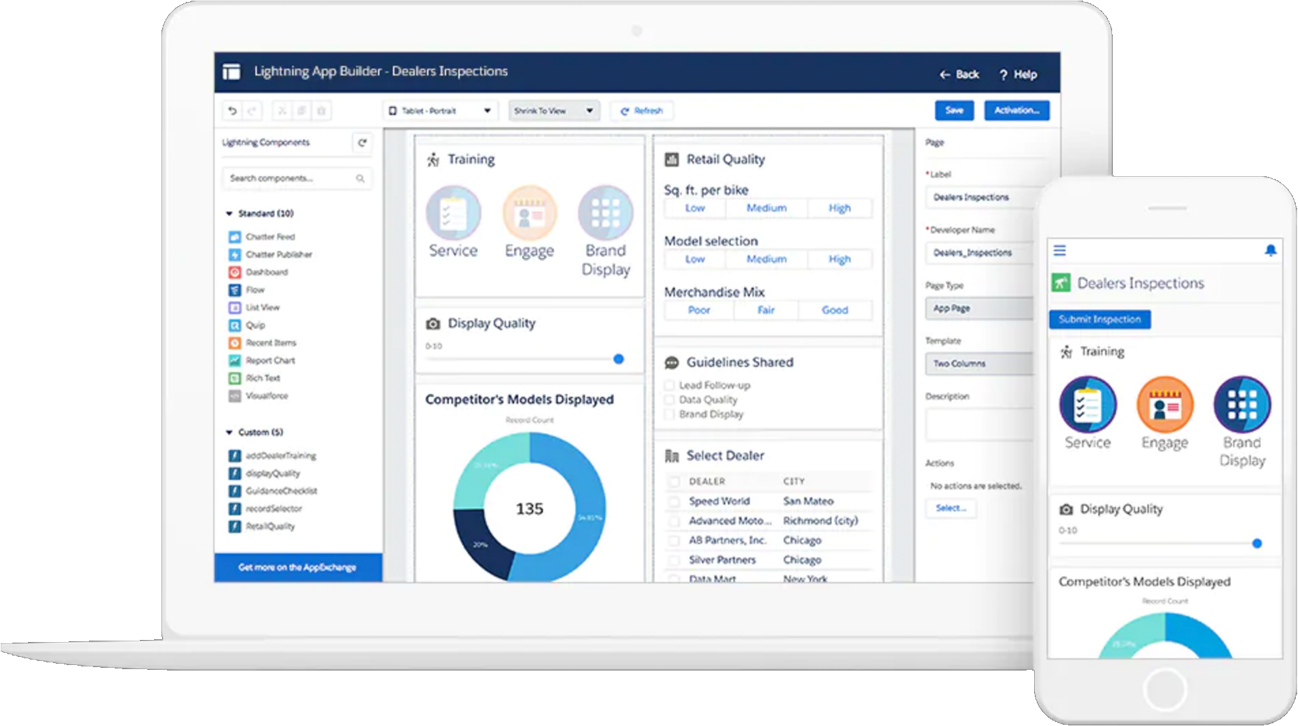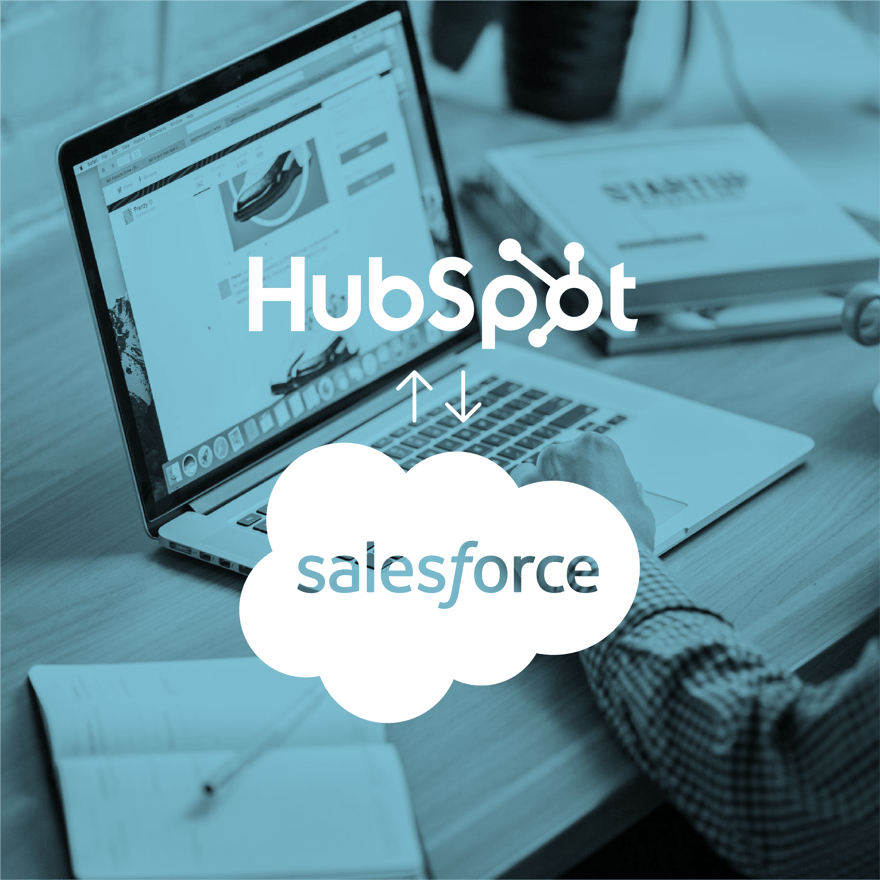Customer relationship management (CRM) software has come a long way in the past thirty years. The focus of CRM software is fairly self explanatory; it helps you manage customer relationships. But such a simple explanation isn’t fair to the value that they truly offer a business. The power of CRMs is in how they automate relationship management and support your conversion cycles by aligning your marketing and sales teams around centralized customer data.
Yet, although CRM software has become commonplace (one might even say mandatory) in today’s business world, trying to choose which software option to pin your company’s future on isn’t a simple choice. The decision has become as complex and powerful as the software itself, and it depends on necessary features, scalability, and budget. This article is going to dive into the comparison between two of the most popular CRMs—HubSpot and Salesforce—and help you understand which your business needs.
Choosing the Right CRM: HubSpot vs. Salesforce
If you’re in the game for a CRM, then you’ve come across the path of the two strongest contenders: HubSpot and Salesforce. Both of these platforms are cloud-based CRMs that unite your various teams’ applications to help you grow sustainably. Both say they offer centralised data management that supports dedicated applications or hubs for marketing, sales or service specific tasks. Both platforms say that they make it easy to automate tedious tasks like reporting, save your teams’ time in tracking leads, and help convert prospects into customers more reliably… Awesome promises. But the real question here is whether or not HubSpot or Salesforce can live up to these expectations? Because despite their similarities, HubSpot and Salesforce are vastly different, and we’re going to explore what these differences might mean for you.
While HubSpot and Salesforce are likely the best CRM platforms around, this means that there’s not too much to differentiate them when it comes to power and functionality. HubSpot is an award-winning platform for medium to enterprise businesses, delivering contact management, sales analytics, sales automation, pipeline management, and so much more. On the other hand, Salesforce is built with enterprise in mind, also offering contact management, dashboards, analytics, pipeline management, sales automation, forecasting and still more. At least, that’s what they say… When looking to set one apart from the other, we need to investigate not only their functionalities, but their ease of use, scalability, and pricing.
Ease of use
The ease of use of your CRM platform is vital, because there’s little point in investing in a platform that should support your marketing, sales and service teams when it’s too complex to use.
For this, HubSpot takes the cake. HubSpot’s powerful tools are designed for the average Joe to manage, meaning that the learning curve is fairly quick and that you don’t necessarily need a dedicated admin. HubSpot achieves this primarily through an incredible knowledge base, dedicated support and a user experience that is built with you and your teams in mind. This allows, usually, for an improvement in your data quality (given its easier use) and combined with its reporting and automation services, it offers greater visibility into your overall business.
Salesforce, on the other hand, has a steeper learning curve and will require an experienced admin (internally or via a consulting agency) to manage the platform. While also immensely powerful, especially its customizable reporting (which is great for larger organisations), the platform can be difficult to implement and take ongoing costly training to continually manage.

Scalable support
The ability to have easy access to support is vital when investing into a CRM platform, unless you employ a host of experienced staff that can solve any issues that arise. Not only is hiring internal support staff costly, it also doesn’t give you direct access to the creators of the platform, and the knowledge will always be second-hand. What you’re looking for is platform support with 24/7 availability that is scalable to your business’s growth and doesn’t cost an arm and a leg.
HubSpot has always had a big focus on customer support. They offer (at no extra charge) phone and email support for all its Pro and Enterprise customers. Better still, as you grow this service remains free… there’s no additional charge if your business grows beyond a certain size, meaning that you can scale without support as a concern.
Salesforce offers 24/7 premier support, yet it is charged at 20% of your net contract price. This means that, as you grow, the cost of your support will grow too, although this does include more immediate support chat options than HubSpot offers.
Holistic solutions
A CRM platform is great for centralizing your customer data, which can take out a lot of the admin around customer conversations and sale conversions. However, if your CRM doesn’t integrate with the other tools and platforms that the rest of your organisation needs to operate… you’re just adding to the web. You simply don’t want your staff to have to log into 10 different platforms each day, just to start working.

Over the years, HubSpot has (luckily) grown far beyond its roots as a singular marketing automation platform. With the Sales Hub, Service Hub, CMS Hub and CRM at its core, and oh, an integration or two… or 500, HubSpot is now a complete platform-based ecosystem – in which you can track your entire customer journey. Bringing your entire organisation under one data roof.
Salesforce on the other hand, developed its own CRM shell for the complex landscape that has now become Salesforce, called: Salesforce Customer 360. I may be a little cynical and sarcastic in my tone of voice, but I think this is a fair statement to make. I often visit companies that have been expertly sewn into the Salesforce suit… Maybe Salesforce was indeed a relief and a unicorn in 2009, but as they grew bigger and bigger (by acquiring more than 60 companies for more than 30 billion dollars…..) helping customers has been put on the back burner if you ask me. What’s still on the agenda is growing shareholder value...
Pricing
Generally when looking at new software, the list price is what stands out and is what we make our decision based off of. That’s a mistake. On first glance, HubSpot and Salesforce are closely priced at their list price… but when you start to investigate the accompanying costs, you get a bigger picture of the true pricing models.
|
HubSpot (Sales Hub Enterprise) |
Salesforce (Sales Cloud Enterprise) |
|
|
List Price |
$1,200/mo for 10 paid users |
$1,500/mo for 10 users |
|
User Licensing |
$120/mo/additional paid user |
$25 - $150/additional user depending on package |
|
Implementation |
Flat rate of $3,000 for Enterprise onboarding. Additional technical consulting services available for additional fees |
Salesforce offers a ‘Jump-Start’ implementation for $5,000 |
|
Customer Support |
Phone and email support included for all Professional and Enterprise plans |
|
|
Outbound Calling |
Included in all plans (2,000 minutes per user/mo for Enterprise), but not available in all countries |
$45/user/mo (for 1,000 minutes) |
|
Sales Engagement |
Included with Enterprise:
|
Inbox $25/user/mo More add-ons |
|
TOTAL (annual for a team of 10) |
$17,400 |
$43,680 |
(Source)
HubSpot clearly comes out on top with regards to pricing, ease of use and the ability for scalable support (without breaking the bank). While Salesforce offers some functions for enterprise users that could be considered a bonus, and comes with its own exceptionally powered system, it’s still a Frankenstein CRM if you ask me. At the end of the day, however, the choice of CRM platform must depend on your business’s immediate needs and vision for growth. In my opinion it’s time to drop the Frankenstein CRM and adopt a platform that’s tailor made to help modern businesses grow.
Want to chat about the benefits of the free HubSpot CRM and Sales Hub Enterprise tools? Book a free 1:1 call.



